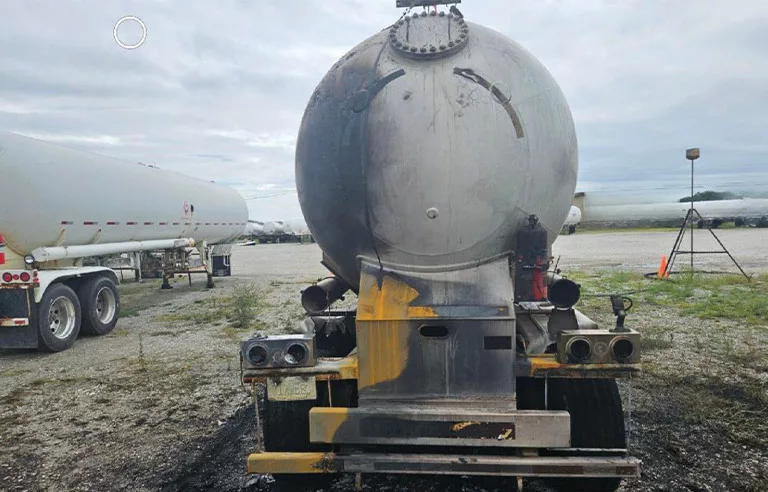
Photo: NIOSH
Case report: #24KY072
Issued by: Kentucky State Fatality Assessment and Control Evaluation Program
Date of report: May 5, 2025
A 20-year-old wash bay attendant had worked for his employer, a commercial trucking company that transports compressed liquefied petroleum gases, for five months. During his shift, a driver arrived at the facility and requested a trailer. A maintenance shop employee coupled a semitruck to a tank trailer but discovered that the trailer’s brakes were seized, so the trailer could not be moved. In addition, a gauge indicated that the trailer still contained compressed butane gas, which needed to be removed so it could be loaded with propane. The process of depressurizing the trailer is referred to as flaring. The flare system sits away from the trailer and expels the gas upward and ignites it, burning the gas rather than releasing raw product directly into the atmosphere. However, in lieu of using the flare, the trailer valve was opened and the butane escaped the trailer via a 20-foot hose that ran along the trailer on the ground. The maintenance employee directed the wash bay attendant to retrieve a grease gun to aid in unseizing the brakes. The attendant positioned himself under the tank trailer. When he activated the electric grease gun, the butane escaping the trailer ignited, engulfing him and the rear of the trailer in fire. The attendant was pulled out from underneath the trailer by another maintenance employee. The other employee immediately called emergency services as he shouted to the attendant to stop, drop and roll, which the attendant eventually did, extinguishing the fire. First responders transported the attendant, who was conscious and communicating, to a hospital. He was placed into a medically induced coma and died seven days later. Cause of death was listed as multisystem organ failure secondary to thermal injuries. Investigators found that the employer did not have a formal trailer flaring procedure or a formal training program for maintenance staff.
To help prevent similar occurrences, employers should:
- Implement a trailer flaring procedure with associated training.
- Require the use of intrinsically safe tools on or around liquefied petroleum gas trailers.
- Implement a formal health and safety program for maintenance staff.
- Prohibit employees from performing duties outside their scope of work.
McCraren Compliance offers many opportunities in safety training to help circumvent accidents. Please take a moment to visit our calendar of classes to see what we can do to help your safety measures from training to consulting.
Original article published by Safety+Health an NSC publication


